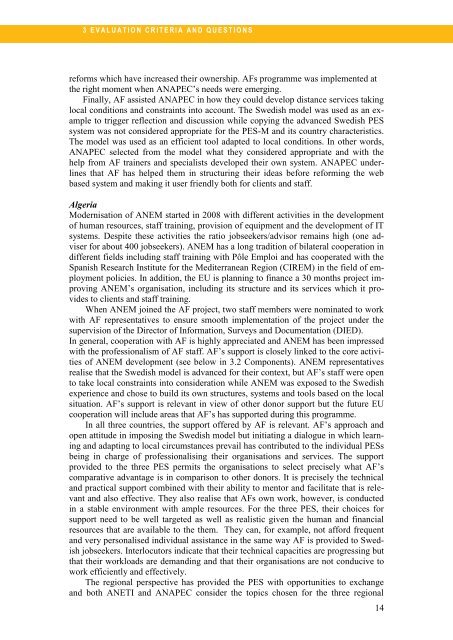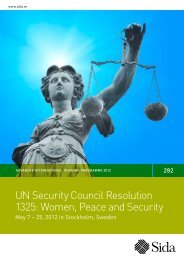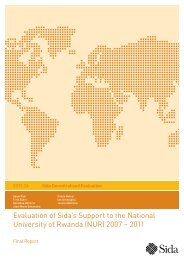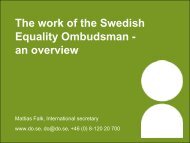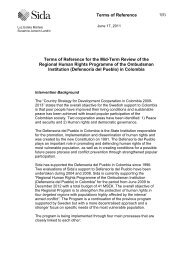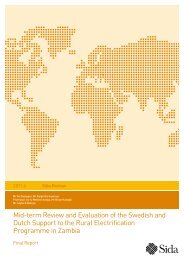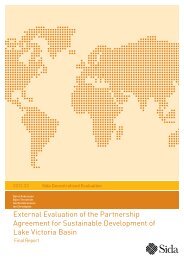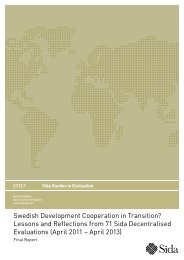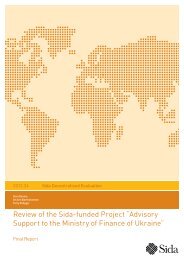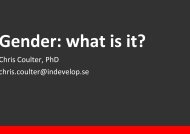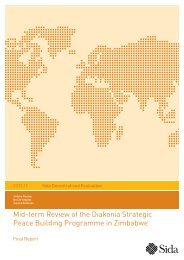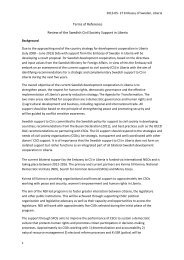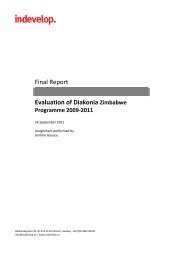Evaluation of the Maghreb Regional Training Programme - Indevelop
Evaluation of the Maghreb Regional Training Programme - Indevelop
Evaluation of the Maghreb Regional Training Programme - Indevelop
You also want an ePaper? Increase the reach of your titles
YUMPU automatically turns print PDFs into web optimized ePapers that Google loves.
e<br />
3 E V A L U A T I O N C R I T E R I A A N D Q U E S T I O N S<br />
reforms which have increased <strong>the</strong>ir ownership. AFs programme was implemented at<br />
<strong>the</strong> right moment when ANAPEC’s needs were emerging.<br />
Finally, AF assisted ANAPEC in how <strong>the</strong>y could develop distance services taking<br />
local conditions and constraints into account. The Swedish model was used as an example<br />
to trigger reflection and discussion while copying <strong>the</strong> advanced Swedish PES<br />
system was not considered appropriate for <strong>the</strong> PES-M and its country characteristics.<br />
The model was used as an efficient tool adapted to local conditions. In o<strong>the</strong>r words,<br />
ANAPEC selected from <strong>the</strong> model what <strong>the</strong>y considered appropriate and with <strong>the</strong><br />
help from AF trainers and specialists developed <strong>the</strong>ir own system. ANAPEC underlines<br />
that AF has helped <strong>the</strong>m in structuring <strong>the</strong>ir ideas before reforming <strong>the</strong> web<br />
based system and making it user friendly both for clients and staff.<br />
Algeria<br />
Modernisation <strong>of</strong> ANEM started in 2008 with different activities in <strong>the</strong> development<br />
<strong>of</strong> human resources, staff training, provision <strong>of</strong> equipment and <strong>the</strong> development <strong>of</strong> IT<br />
systems. Despite <strong>the</strong>se activities <strong>the</strong> ratio jobseekers/advisor remains high (one adviser<br />
for about 400 jobseekers). ANEM has a long tradition <strong>of</strong> bilateral cooperation in<br />
different fields including staff training with Pôle Emploi and has cooperated with <strong>the</strong><br />
Spanish Research Institute for <strong>the</strong> Mediterranean Region (CIREM) in <strong>the</strong> field <strong>of</strong> employment<br />
policies. In addition, <strong>the</strong> EU is planning to finance a 30 months project improving<br />
ANEM’s organisation, including its structure and its services which it provides<br />
to clients and staff training.<br />
When ANEM joined <strong>the</strong> AF project, two staff members were nominated to work<br />
with AF representatives to ensure smooth implementation <strong>of</strong> <strong>the</strong> project under <strong>the</strong><br />
supervision <strong>of</strong> <strong>the</strong> Director <strong>of</strong> Information, Surveys and Documentation (DIED).<br />
In general, cooperation with AF is highly appreciated and ANEM has been impressed<br />
with <strong>the</strong> pr<strong>of</strong>essionalism <strong>of</strong> AF staff. AF’s support is closely linked to <strong>the</strong> core activities<br />
<strong>of</strong> ANEM development (see below in 3.2 Components). ANEM representatives<br />
realise that <strong>the</strong> Swedish model is advanced for <strong>the</strong>ir context, but AF’s staff were open<br />
to take local constraints into consideration while ANEM was exposed to <strong>the</strong> Swedish<br />
experience and chose to build its own structures, systems and tools based on <strong>the</strong> local<br />
situation. AF’s support is relevant in view <strong>of</strong> o<strong>the</strong>r donor support but <strong>the</strong> future EU<br />
cooperation will include areas that AF’s has supported during this programme.<br />
In all three countries, <strong>the</strong> support <strong>of</strong>fered by AF is relevant. AF’s approach and<br />
open attitude in imposing <strong>the</strong> Swedish model but initiating a dialogue in which learning<br />
and adapting to local circumstances prevail has contributed to <strong>the</strong> individual PESs<br />
being in charge <strong>of</strong> pr<strong>of</strong>essionalising <strong>the</strong>ir organisations and services. The support<br />
provided to <strong>the</strong> three PES permits <strong>the</strong> organisations to select precisely what AF’s<br />
comparative advantage is in comparison to o<strong>the</strong>r donors. It is precisely <strong>the</strong> technical<br />
and practical support combined with <strong>the</strong>ir ability to mentor and facilitate that is relevant<br />
and also effective. They also realise that AFs own work, however, is conducted<br />
in a stable environment with ample resources. For <strong>the</strong> three PES, <strong>the</strong>ir choices for<br />
support need to be well targeted as well as realistic given <strong>the</strong> human and financial<br />
resources that are available to <strong>the</strong> <strong>the</strong>m. They can, for example, not afford frequent<br />
and very personalised individual assistance in <strong>the</strong> same way AF is provided to Swedish<br />
jobseekers. Interlocutors indicate that <strong>the</strong>ir technical capacities are progressing but<br />
that <strong>the</strong>ir workloads are demanding and that <strong>the</strong>ir organisations are not conducive to<br />
work efficiently and effectively.<br />
The regional perspective has provided <strong>the</strong> PES with opportunities to exchange<br />
and both ANETI and ANAPEC consider <strong>the</strong> topics chosen for <strong>the</strong> three regional<br />
14


